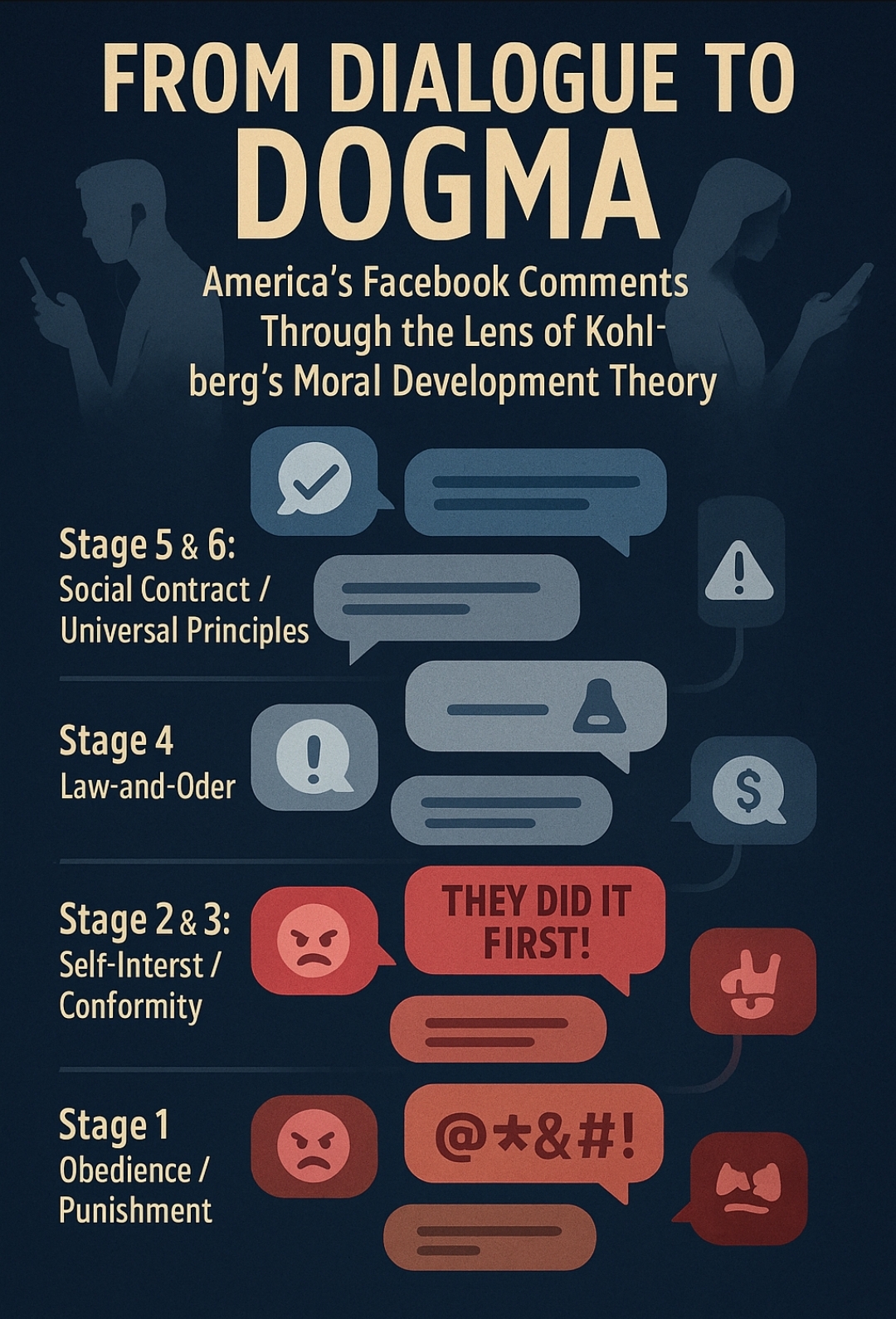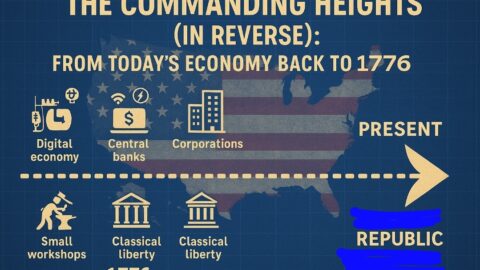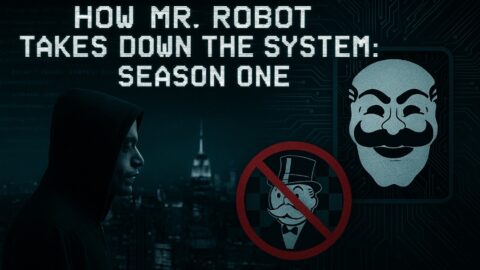Introduction:
The explosion of social media has made it possible to observe, in real time, how people process crisis, disagreement, and power. In Facebook comments—especially about war, Israel, Iran, Trump, and national trauma—we see not just opinions, but a live cross-section of American moral reasoning.
When mapped against Lawrence Kohlberg’s Moral Development Theory, the patterns reveal the underlying crisis: a nation caught between dialogue and dogma, rarely rising above tribal or institutional thinking.
Kohlberg’s Theory of Moral Development
Kohlberg’s Moral Development: The Framework
Kohlberg, building on Piaget, proposed that moral reasoning develops through six stages, grouped in three levels:
Level 1: Pre-Conventional (Childhood)
- Stage 1: Obedience and Punishment (“If you break the rule, you get punished!”)
- Stage 2: Individualism and Exchange (“What’s in it for me?”)
Level 2: Conventional (Most Adolescents/Adults)
- Stage 3: Good Interpersonal Relationships (“Be nice so people approve.”)
- Stage 4: Law and Order (“Rules and authority must be obeyed!”)
Level 3: Post-Conventional (Few Adults Reach This)
- Stage 5: Social Contract and Individual Rights (“Are the laws just? What’s the higher principle?”)
- Stage 6: Universal Ethical Principles (“Justice, conscience, and universal good above all.”)
Facebook Comments as a Moral Barometer
Stage 1 & 2: The Childish Roots
- “Trump kept us safe! Iran is evil!”
Motivation: Avoid punishment, gain reward, see the world as black/white.
Observation: Name-calling, “traitor,” or “idiot” for opposing war, knee-jerk patriotism. - “I just want cheap gas; bomb them!”
Motivation: Personal gain, short-term self-interest.
Stage 3: Social Approval and Team Loyalty
- “Real Americans support Trump/Israel/the military!”
- “You’re not a patriot if you criticize the president in a crisis!”
Motivation: Fit in, avoid shame, seek approval of one’s “tribe” or peer group.
Observation: Groupthink, piling on dissenters, virtue signaling.
Stage 4: Law and Order / Legalism
- “The president must defend us—Congress is too slow!”
- “It’s legal because the War Powers Act says so.”
- “If you don’t stand with Israel, you’re anti-Semitic!”
Motivation: Respect for authority, rules, and existing order (even when selectively applied).
Observation: Hyper-focus on legality over legitimacy, obedience over conscience.
Stage 5: Social Contract / Principle-Based Dissent
- “Shouldn’t we debate these wars first? Is this really constitutional?”
- “Who benefits, who pays the price, and what history can teach us?”
Motivation: Question laws/rules for justice, protect rights, think beyond partisan loyalty.
Stage 6: Universal Ethics / Moral Courage
- “Blindly following leaders is not Christian—conscience matters.”
- “The more we value things outside our control, the less control we have.”
- “We must defend liberty, truth, and human dignity—even when unpopular.”
Motivation: Guided by universal moral principles, not fear, pressure, or tribe.
Observation: Rare, often shouted down or ignored in comments.
Why Do Most Adults Stay Stuck at Stage 3–4?
Kohlberg’s own research (and subsequent longitudinal studies) found:
- Most people never rise above Stage 4 (Law-and-Order/legalism).
- Only a minority reach even Stage 5 (questioning unjust laws, applying higher-order thinking).
- Few attain Stage 6 (conscience-based, universal ethics).
- Social pressure, education, media, and family conditioning can cement people in their childhood or tribal patterns, unless a major life crisis or serious self-reflection pushes them higher.
What the Facebook “Dogma” Reveals:
- Emotional Reasoning: Most comments are emotionally reactive, not rational or principle-driven.
- Binary Thinking: Us/them, hero/villain, right/wrong, red/blue—few tolerate nuance or complexity.
- Obedience to Authority: “If my party, my leader, or my faith says it, it must be true.”
- Fear of Exclusion: Social media “likes” and “piles-on” reward conformity and punish dissent.
Society’s Crisis: Dialogue Is Replaced by Dogma
- Tribal morality is now mass-mediated. Social media amplifies conformity, outrage, and scapegoating.
- Institutional loyalty is mistaken for virtue. Defending your “side” is seen as good, regardless of the moral quality of its actions.
- Those asking bigger questions are branded naive, dangerous, or even traitorous.
Why This Matters:
- A society stuck at Stage 3–4 cannot have real dialogue, constitutional self-correction, or resilience in crisis.
- Dogma replaces dialogue, and tribal loyalty replaces moral courage.
- *This is exactly the pattern the architects of destructive capitalism, disaster profiteering, and global control exploit: an emotionally reactive, easily manipulated, stage-4 populace.
Moving Forward: A Call to Stage 5–6 Thinking
- Embrace Self-Reflection: “Am I following my conscience, or just my group?”
- Defend Principles, Not Personalities: Ask, “Is this just, is it true, is it good for all?”
- Encourage Dissent, Nuance, and Dialogue: Real patriotism is holding every leader to the same constitutional, ethical standards.
- Model Moral Maturity: In public forums and private life, reward those who challenge, think, and care for universal good.
Conclusion:
Kohlberg’s theory, played out in America’s social media landscape, explains why we keep repeating the same mistakes.
Until we move from dogma to dialogue—and from tribal obedience to universal moral reasoning—we remain vulnerable to every new crisis, every new racket, and every new manipulator in power.







